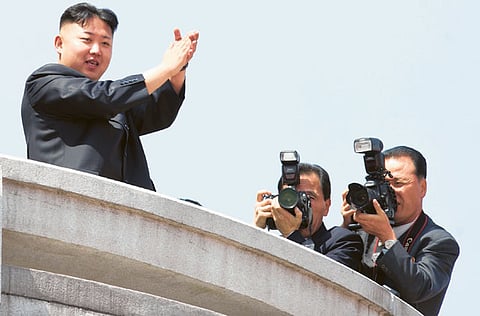Reviving a 'hemiplegic patient'
China is key to creating a free-trading, nuclear weapons-free and peaceful Korean peninsula

When the acting speaker of the national assembly of South Korea, Chung Ui-hwa, recently visited New York — the first top South Korean politician to visit the US since North Korea's recent unsuccessful missile launch — he emphasised that reunification of South and North Korea was critical for peace and stability in northeast Asia and beyond.
Chung, a neurosurgeon-turned-politician, compared the divided Korean peninsula to a "hemiplegic patient" needing resuscitation.
Though recent developments in North Korea — the new Kim Jong-un regime, the missile firing, the general hostile propaganda emanating from the North against South Korea, Pyongyang's nuclear programme — have alarmed not only Seoul, but also Japan and the US, Chung harped on taking the "path to reunification, no matter how long and bumpy the journey might be".
Chung's "clear vision" for One Korea envisioned a free-trading, nuclear weapons-free, peaceful and open Korea. "A divided peninsula is a liability to Northeast Asia, but a unified one will turn out to be a tremendous asset to the region and beyond, making an enormous contribution to regional and global peace and prosperity," he maintained.
He called for efforts to bring North Korea "out of its shell" and engage in discussions, "even though Pyongyang is responsible for its own isolation".
He urged North Korea to normalise relations with both Washington and Tokyo.
The six-party talks on Korea, which also include China, Russia, Japan and the US, are aimed at dismantling North Korea's nuclear weapons programme, he said. The forum should also address how to establish a peace regime on the peninsula and in Northeast Asia. "In the long run, the framework should serve as a foundation for supporting reunification," he emphasised.
Chung called for addressing both the nuclear issue and reunification, and cautioned against separating the two.
German example
The example of German reunification has often served South Korean politicians, including Chung, as an inspiration for reunification; some see it as a panacea for the Korean peninsula's problems. Chung said that Germany's then oppositionist Christian Democratic Union (CDU) was not happy with the ruling Social Democratic Party's appeasement of East Germany.
"Nevertheless, the CDU government inherited the policy of Ostpolitik [initiated by former chancellor Willy Brandt] and succeeded in leaving the enduring legacy of German unification," Chung said.
Of course, it is important for the South to hold talks with the North because when people talk, they do not shoot at each other. Despite the improbability of an inter-Korean summit taking place anytime soon, one should explore the possibility of holding an inter-Korean parliamentary meeting.
North Korea had, in fact, responded positively to such a proposal mooted by the South in the past but, as Chung admitted, "conditions were not mature for the Korean National Assembly to push ahead with the proposal, so we had to pass up the opportunity for what could have been a historic meeting".
A solution to the Korean peninsula division cannot be found without China's active participation aimed at weaning away North Korea from being a permanent economic basket case and a pariah state developing weapons of mass destruction; if this is not done, reunification and the goal of peace and prosperity in northeast Asia will only be a mirage.
With the vast majority of its population facing near starvation, Pyongyang's massive armament is not just an aberration but also spells doom and destruction. The totalitarian state also stands accused of systematic human rights abuses, with reports of torture, public executions, slave labour, and forced abortions and infanticides in prison camps.
North Korea, perhaps the world's most secretive society shaped after founder Kim Il-sung's philosophy of juche (self-reliance), has nuclear ambitions which seem to be only exacerbated with its rigidly maintained isolation from the rest of the world.
North Korea, which flaunts its nuclear muscle to extract food and other forms of aid from donour countries, is believed to have more than 1,000 missiles of varying capabilities.
Pyongyang's programme has progressed over the last few decades from tactical artillery rockets in the 1960s and 70s to short-range and medium-range ballistic missiles in the 1980s and 90s. Systems capable of greater ranges are understood to be under research and development. North Korean missiles, according to some experts, may also be capable of carrying nuclear warheads.
While the recent unsuccessful launch of an Unha-3 rocket with a satellite was seen by many as a disguised test of long-range missile technology banned under UN resolutions, Pyongyang said that the aim of the launch was to put a satellite into orbit to mark the 100th anniversary of the birth of the nation's founder Kim Il-sung.
China can demonstrate its credentials as a responsible member of the international community by cooperating more actively with the US and promoting inter-Korean reconciliation and cooperation, denuclearisation of the Korean peninsula and opening of North Korean society.
Manik Mehta is a commentator on Asian affairs.


